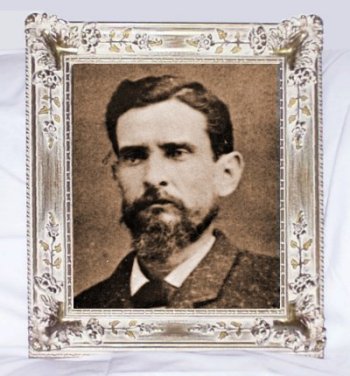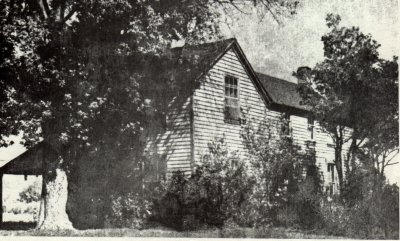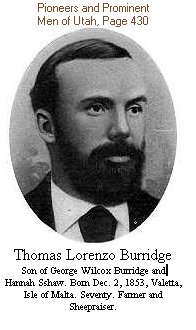|
THE LIFE SKETCH OF GEORGE WILCOX BURRIDGE (Part 14 1868 - 1888 Bishop, Storekeeper, and Indians - oh my) Written by his grand-daughter, Ann M. Neddo
|
|||||
|
Part 1 1805 - 1831 Youth Part 2 1831 - 1847 Army Part 3 1847 Courtship & Marriage Part 4 1847 - 1852 Marriage, Baptism and the End of a Career Part 5 1853 - 1855 Isle of Malta mission Part 6 1855 - Going to Zion Part 7 1855 - 1857 Hard times Part 8 1857 - 1860 (?) Johnson's army and back to Rush Valley Part 9 1866 - 1867 Patriarchal blessings, Mission call and departure Part 10 1867 Journey to the British mission Part 11 1867 - Mission Part 12 1868 - Mission Part 13 1868 - Return Home Part 14 1868 - 1888 Bishop, Storekeeper, and Iindians - oh my Part 15 As seen by others Part 16 1880 -1888 The culmination of a lifetime Part 17 1888 -1891 Patriarch and Death Part 18 Miscellaneous |
He was set apart as Bishop of the St. John Ward on June 24, 1877 when St. John was organized as a regular Bishop's Ward. He served as President of the Branch from 1868. He and Hannah established a branch of Z. C. M. I. in their home. All who knew him came to recognize his qualities of a true leader. The outstanding ones being humility, fearlessness, truthfulness, honesty, wisdom, understanding, and love of his fellowmen. The years passed rapidly, each day bringing its joys and pains, its sorrow and satisfactions. Always George walked the path the Lord had marked. In a few years he was spoken of as "the King of Rush Valley. " This title being given because of his many activities. His home was the bank and he the banker for many thousands of dollars for the pay rolls for the Ophir and Mercur Mines. He was Justice of the Peace. He was a director in the first grist mill in Tooele County. Many overland travelers found lodgings and food at his home. He helped emigrants and travelers, especially all the church members to the extent that they made beds on the floors many times. He would clean their shoes and do everything for their comfort and convenience. His was the place where hardened criminals were kept when being transported across country. He acted as Judge in disputes in Rush Valley. His home was the Post Office he the postmaster and storekeeper with the help of his able family. He was an expert tailor. As Bishop he was truly the father of the ward. His helping hand was always out to grubstake those in need, his guidance and direction was ever over the young people. His heart yearned for them when some made a mis-step. The wayward one was taken to the prayer room in his home where the two of them knelt and prayed for help and forgiveness. One such, when an old man told of his experience with "Grandpa Burridge" as he affectionately called him, although not related to him. This had a lasting affect upon this boy. When as this old man he was a afflicted and crippled with arthritis, he was desperately poor. Years before he had purchased the Burridge home and now found himself forced to sell it for sustainance for himself and his aged wife. He was offered an exceedingly high price for his home. Wondering what the men intended to use the home for he inquired before making up his mind to sell. When told they wanted to convert it to a roadhouse tavern he refused the much needed money. Never would he be a party to desecrate the hallowed home of Bishop Burridge. They would get along some how without that tainted money. Such was the influence and love of this faithful man, to last down through the years. Manners were checked and he demanded the best. One day a young neighbor girl was visiting with his daughter, she became angry and flounced out of the house banging the door behind her. He called her but she refused to answer; hurrying on to her home across the street. He followed her home, explaining why he had come he took her back to close the door properly. He was an expert swordsman. His sword hung over the door ready to his hand and on occasions he whipped it out to prove a point when dealing with unruly men. The Indians came to him as a friend and he fed them and their horses. [Editor's note - Where is George's sword today?] George was good at sewing up wounds. The Indians often came to him for help in sickness and many times he doctored them. One time an Indian came to him because he feared he was going blind. He wanted George to "wynea fix 'em" (that is make them well). His eyes were badly inflamed and sore. George pondered what to do, silently asking Heavenly guidance. Then he got a bottle of sugar of lead and poured some into the Indians eyes. The Indian was badly frightened and said he would never see Tabby (sun) again. He howled with pain and threatened all manner of curses upon George. Then he fled the house as one blinded, indeed! Days later he returned saying medicine was "Wynea good" and he had come back for more "wynea", as his eyes were much better. George always refused to sell hard drinks of any kind at his store. He lamented that fact that some people gave or sold whisky to the Indians. One day he sat in tailors position of legs crossed on the counter while keeping store. Business was slack. He tailored in the winter months. He had learned this trade while in the army. He and his daughter Pauline made the overalls for the store. He made men's suits and gloves. He embroidered the dress gloves beautifully. He wasted not a moment of his life. So he plied his trade of tailoring during the slow time. As his needle flashed in and out of the cloth the open door was darkened by the figure of a huge Indian. George put aside his work and offered help to his red skinned customer, who demanded "fire water" and became ugly tempered and mean when told there was none there. He kicked the dog and ordered Hannah to get food for him. As the abuse of the Indian toward him and Hannah grew steadily worse, George Wilcox stepped over to the sword. Reached up his hand and brought it flashing down. He forced the angry half drunken Indian out of the store and off of the premises.
President Heber J. Grant, Francis M. Lyman and many of the General Authorities of the Church were guests in his home and supped many times at his bountiful table. Ever he struggled to keep every member of his ward and the out- lying Branches, active members in good standing in the Church. George firmly believed that when a meeting was set that Angels were assigned to attend that meeting. So come what may the meeting must start at the appointed hour, it was not uncommon in those early days for George to be the only one in attendance at the meeting. Whether alone or accompanied by members of his family, or with a full congregation, he called the meeting to order at the specified time. Prayer was given, hymns sang, sermon preached that all might be in order.
|
||||
| About this site |
GEDCOM files
|
Other stories
|
| Reunion news |
||
|
Family Newsletter |
George's diaries
|
|


